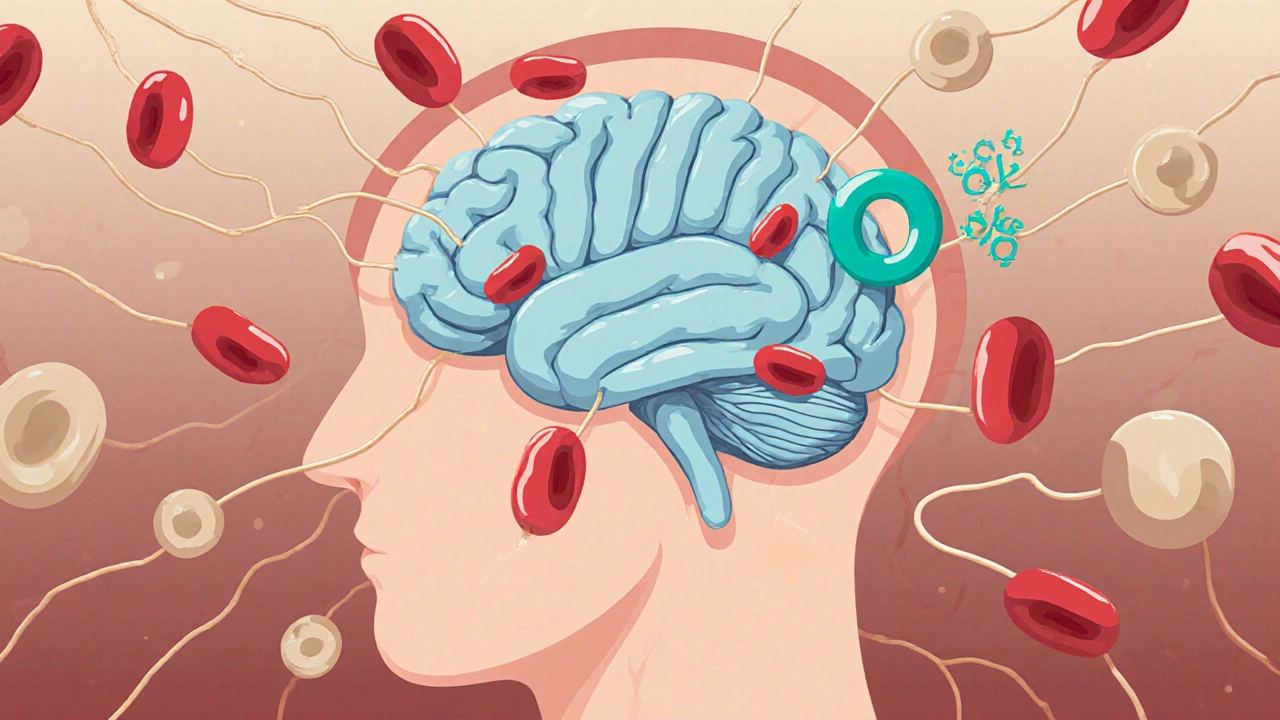Ever wondered why you feel foggy after a bad lunch or why a simple memory task suddenly feels impossible? The answer often traces back to the blood that fuels your brain. When the blood can’t carry enough oxygen or essential nutrients because of a nutritional deficiency, the brain pays the price - slower thinking, poorer memory, and reduced mental stamina. This article unpacks exactly how nutritional anemia sabotages cognition and what you can do to protect your mental edge.
What Is Nutritional Anemia?
Nutritional anemia is a condition where a lack of key nutrients such as iron, vitamin B12, or folate reduces the production of healthy red blood cells. Without enough hemoglobin, red blood cells can’t transport oxygen efficiently, leading to systemic fatigue and, importantly for our focus, impaired brain function. It’s one of the most common forms of anemia worldwide, especially in populations with limited access to diverse diets.
How the Brain Receives Oxygen and Nutrients
The brain consumes about 20% of the body’s oxygen despite representing only 2% of body weight. Oxygen is delivered via hemoglobin inside red blood cells, while nutrients like glucose, iron, and B vitamins cross the blood‑brain barrier to support neurotransmitter synthesis, myelin formation, and neuronal metabolism. When anemia reduces oxygen delivery, neurons switch to less efficient energy pathways, producing fewer ATP molecules and more reactive oxygen species. Over time, this metabolic strain erodes synaptic plasticity - the basis for learning and memory.
Iron‑Deficiency Anemia and Cognitive Impact
Iron‑deficiency anemia occurs when iron stores are depleted, limiting hemoglobin synthesis and causing low blood‑oxygen levels. Iron is also a co‑factor for enzymes that produce dopamine, norepinephrine, and serotonin - the brain’s primary neurotransmitters. A 2023 longitudinal study of 1,200 adolescents found that those with ferritin levels below 15 µg/L performed 12% worse on standardized reading tests and showed slower reaction times on computer‑based attention tasks.
- Key mechanisms: reduced dopamine synthesis, impaired myelin production, and decreased mitochondrial efficiency.
- Typical symptoms: difficulty concentrating, frequent day‑time sleepiness, and slower processing speed.
These effects are reversible if iron is replenished early. One clinical trial reported a 30% improvement in working‑memory scores after eight weeks of oral ferrous sulfate combined with vitamin C (which boosts iron absorption).
Vitamin B12 Deficiency Anemia and Brain Health
Vitamin B12 deficiency anemia results from insufficient cobalamin, leading to macro‑cytic red blood cells and neurologic dysfunction. B12 is essential for the methylation cycle, which produces S‑adenosyl‑methionine (SAMe), a methyl donor critical for myelin sheath integrity and neurotransmitter regulation. In older adults, B12‑related anemia correlates with a 1.8‑fold increase in dementia risk.
Neurological manifestations often precede hematologic signs. Patients may report:
- Persistent brain fog
- Difficulty recalling recent events
- Impaired executive function (planning, multitasking)
High‑dose methylcobalamin supplementation (1,000 µg daily) has been shown to improve Mini‑Mental State Examination (MMSE) scores by 2‑3 points over three months, especially when combined with folate.

Folate (Vitamin B9) Deficiency Anemia and Neurodevelopment
Folate deficiency anemia is characterized by impaired DNA synthesis, leading to megaloblastic red blood cells. Folate participates directly in the synthesis of nucleic acids and the regeneration of methionine, influencing brain development and cognitive resilience. Pregnant women with low folate levels have infants with lower scores on the Bayley Scales of Infant Development.
In adults, chronic folate deficiency is linked to slower psychomotor speed and reduced verbal fluency. A meta‑analysis of five randomized trials (n = 2,340) showed that daily 400 µg folic acid supplementation improved scores on Trail‑Making Test B by an average of 7 seconds.
Other Nutrient‑Related Anemias that Touch the Brain
While iron, B12, and folate dominate the conversation, copper and zinc also play subtle roles. Copper is required for cytochrome c oxidase, a key enzyme in cellular respiration. Zinc acts as a co‑factor for over 300 enzymes, including those that modulate synaptic plasticity. Deficiencies in these trace minerals can aggravate anemia‑related cognitive decline, especially in malnourished or elderly populations.
Comparison of Major Nutritional Anemias and Their Cognitive Effects
| Deficiency | Primary Blood Effect | Key Brain Impact | Typical Cognitive Symptoms | Reversibility |
|---|---|---|---|---|
| Iron | Low hemoglobin, microcytic RBCs | Dopamine synthesis, myelin formation | Attention lapses, slower processing | High with early iron repletion |
| Vitamin B12 | Macro‑cytic RBCs, elevated MCV | Myelin integrity, methylation cycle | Brain fog, memory loss, exec. dysfunction | Partial‑to‑full, depends on duration |
| Folate | Macro‑cytic RBCs, low serum folate | DNA synthesis, SAMe production | Slowed psychomotor speed, verbal fluency drop | Good if supplemented early |
| Copper | Variable, often normocytic | Cytochrome c oxidase activity | Subtle attention deficits | Improves with copper intake |
| Zinc | Often mixed‑type anemia | Synaptic plasticity, antioxidant defense | Memory encoding issues | Responsive to zinc supplementation |

Practical Steps to Guard Your Brain Against Anemia‑Induced Decline
Knowing the science is only half the battle. Here’s a straightforward action plan you can start today:
- Screen regularly: CBC, ferritin, serum B12, and folate levels at least once a year, especially if you’re pregnant, elderly, or follow a restrictive diet.
- Eat iron‑rich foods: Lean red meat, lentils, spinach, and fortified cereals. Pair with vitamin C (citrus, bell peppers) to boost absorption.
- Boost B12 intake: Include animal products (eggs, dairy, fish) or fortified plant milks. Vegans should consider a weekly 2,500 µg cyanocobalamin supplement.
- Don’t forget folate: Dark leafy greens, legumes, and citrus fruits. A daily 400 µg folic acid supplement is safe for most adults.
- Mind trace minerals: Nuts, seeds, and whole grains provide copper and zinc. If you have malabsorption issues, discuss chelated mineral formulas with your doctor.
- Stay hydrated: Adequate fluid intake helps maintain blood volume and supports cerebral perfusion.
- Exercise smart: Moderate aerobic activity (30 min, 5 days/week) increases red blood cell turnover and improves oxygen delivery to the brain.
When you correct a deficiency, most cognitive symptoms improve within weeks to months. However, chronic, untreated anemia can cause lasting neuronal loss, especially in the hippocampus - the region responsible for forming new memories.
Quick Checklist: Is Your Brain Getting Enough Blood‑Borne Fuel?
- Do you feel unusually tired after meals? -> Test iron and B12.
- Is forgetting names a daily struggle? -> Check folate levels.
- Are you on a strict vegan or vegetarian diet? -> Consider B12 supplementation.
- Do you have gastrointestinal issues (e.g., celiac, Crohn’s)? -> Screen for multiple nutrient deficiencies.
If you answer “yes” to any of these, schedule a blood panel and start the dietary tweaks above.
Frequently Asked Questions
Can mild anemia really affect my memory?
Yes. Even a modest drop in hemoglobin (e.g., from 14 g/dL to 11 g/dL) can reduce cerebral oxygen delivery enough to slow information processing and short‑term memory retrieval. Studies show that people with mild iron‑deficiency score lower on working‑memory tests than matched controls.
How long does it take for brain function to recover after fixing a deficiency?
Recovery speed varies by nutrient and severity. Iron repletion can improve attention within 2-4 weeks, while B12‑related neurological symptoms may need 3-6 months of high‑dose supplementation to see noticeable cognitive gains.
Are there safe upper limits for iron or B12 supplements?
Iron excess can cause gastrointestinal distress and, in rare cases, oxidative damage. The tolerable upper intake level for adults is 45 mg/day. B12 has a very high safety margin; doses up to 2,000 µg daily are generally considered safe because excess is excreted.
Can a plant‑based diet cause these anemia‑related brain issues?
Yes, especially for vitamin B12, which is naturally found almost exclusively in animal products. Vegans should use fortified foods or a reliable B12 supplement. Iron from plant sources is less bioavailable, so pairing with vitamin C and avoiding tea/coffee at meals helps absorption.
Understanding the link between blood health and brain performance flips the script on “just feeling tired.” By catching and correcting nutritional anemia early, you preserve the oxygen and nutrients your brain needs to think clearly, learn quickly, and stay sharp for years to come.

